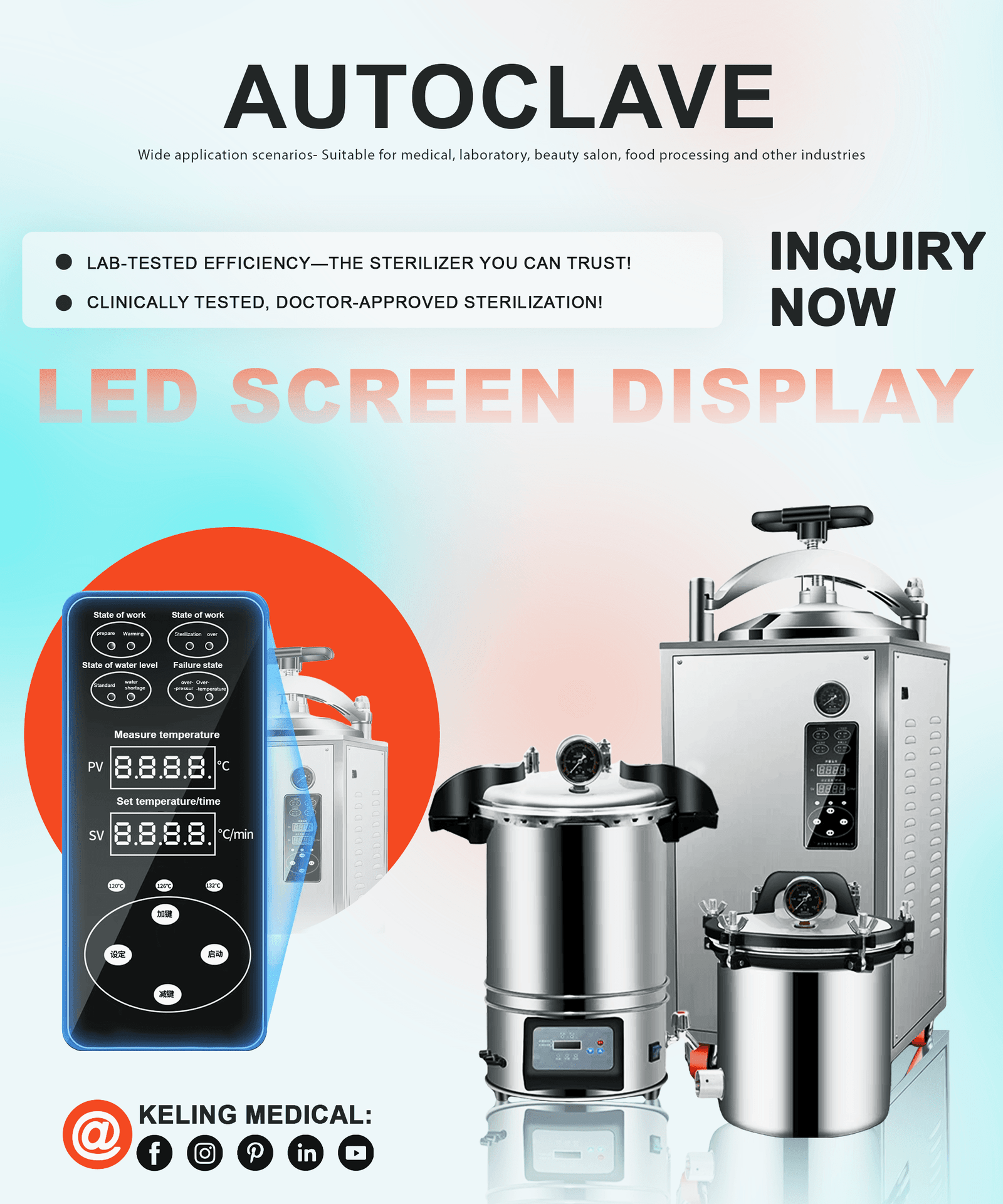
Class B Autoclaves
Pre-vacuum phase for enhanced sterilization
This autoclave model is capable of sterilizing all variety of loads which includes hollow instruments.
Temperature range: 121°C-134°C
Pressure levels: 15-30 PSI
Compliance with EN 13060 standards
Class N Autoclaves
Basic sterilization for solid instruments
Gravity displacement technology
Limited application scope
Cost-effective solution for specific needs
Class S Autoclaves
Intermediate capabilities
Manufacturer-specific cycles
Specialized applications
Chamber Design
Stainless steel 316L construction
Horizontal or vertical configuration
Capacity options:
Compact (8-12L)
Standard (16-18L)
Large (22-24L)
Professional (>24L)
Control Systems
Microprocessor-based operation
LCD/LED display interface
Multiple program settings
Data logging capabilities
USB/printer connectivity
Remote monitoring options
Safety Features
Door safety locks
Pressure safety valve
Temperature monitoring
Water level detection
Emergency stop function
Over-temperature protection
Quality Management
ISO 13485:2016 certification
GMP compliance
Quality control documentation
Batch testing protocols
Validation procedures
International Standards
CE marking requirements
FDA guidelines
EN 13060 compliance
ISO 17665 sterilization standards
Regional certification needs
Material Selection
Medical-grade components
Traceable raw materials
Quality certification requirements
Supplier validation process
Assembly Process
Cleanroom environment
Quality checkpoints
Testing procedures
Documentation requirements
Packaging Requirements
Protection during transit
Environmental conditions
Storage specifications
Shelf life considerations
Logistics Management
Global shipping solutions
Import/export documentation
Customs clearance support
Warehousing options
Technical Support
Installation guidance
Operation training
Troubleshooting assistance
Regular maintenance schedules
Documentation
User manuals
Technical specifications
Maintenance guides
Validation certificates
Technology Advancement
IoT integration
Remote monitoring capabilities
Energy efficiency improvements
Water consumption optimization
Environmental Considerations
Eco-friendly materials
Energy-saving features
Reduced water consumption
Sustainable packaging
Investment Considerations
Initial purchase costs
Operating expenses
Maintenance requirements
Spare parts availability
Training needs
ROI Factors
Equipment lifespan
Performance reliability
Market demand
Competition analysis
The selection of a dental autoclave manufacturer depends on evaluating technical specifications alongside compliance requirements and potential for long-term partnerships. Achievement in the dental equipment market requires collaboration with manufacturers who show dependable quality standards while providing reliable support and delivering innovative solutions.
Q1: What are the standard warranty terms? A: Typical warranty coverage includes 12-24 months for parts and technical support.
Q2: How long is the average production lead time? A: Standard production lead time ranges from 15-30 days, depending on order volume.
Q3: What certifications should I look for? A: Essential certifications include CE marking, ISO 13485, and relevant regional approvals.
Q4: Can products be customized for different markets? A: Yes, voltage requirements, control interfaces, and branding can be customized.
Q5: What after-sales support is typically provided? A: Comprehensive support including technical training, maintenance guidance, and spare parts supply.
Ready to explore premium dental autoclave solutions? Contact Keling Medical today:
Email: inquiry@shkeling.com WhatsApp: +86 182 2182 2482 Website: https://autoclaveequipment.com
Why Choose Our Solutions?
Professional OEM/ODM Services
Comprehensive Quality Control
Global Distribution Support
Competitive Pricing
Expert Technical Support
Contact us now for detailed product information and distributor opportunities!

The autoclaving process serves as an essential sterilization practice utilized across medical, laboratory, and research facilities to protect glassware and instruments through effective sterilization. High-pressure steam eliminates pathogens during this

The autoclaving process serves as an essential sterilization practice utilized across medical, laboratory, and research facilities to protect glassware and instruments through effective sterilization. High-pressure steam eliminates pathogens during this
The autoclaving process serves as an essential sterilization practice utilized across medical, laboratory, and research facilities to protect glassware and instruments through effective sterilization. High-pressure steam eliminates pathogens during this
The autoclaving process serves as an essential sterilization practice utilized across medical, laboratory, and research facilities to protect glassware and instruments through effective sterilization. High-pressure steam eliminates pathogens during this
The autoclaving process serves as an essential sterilization practice utilized across medical, laboratory, and research facilities to protect glassware and instruments through effective sterilization. High-pressure steam eliminates pathogens during this
The autoclaving process serves as an essential sterilization practice utilized across medical, laboratory, and research facilities to protect glassware and instruments through effective sterilization. High-pressure steam eliminates pathogens during this